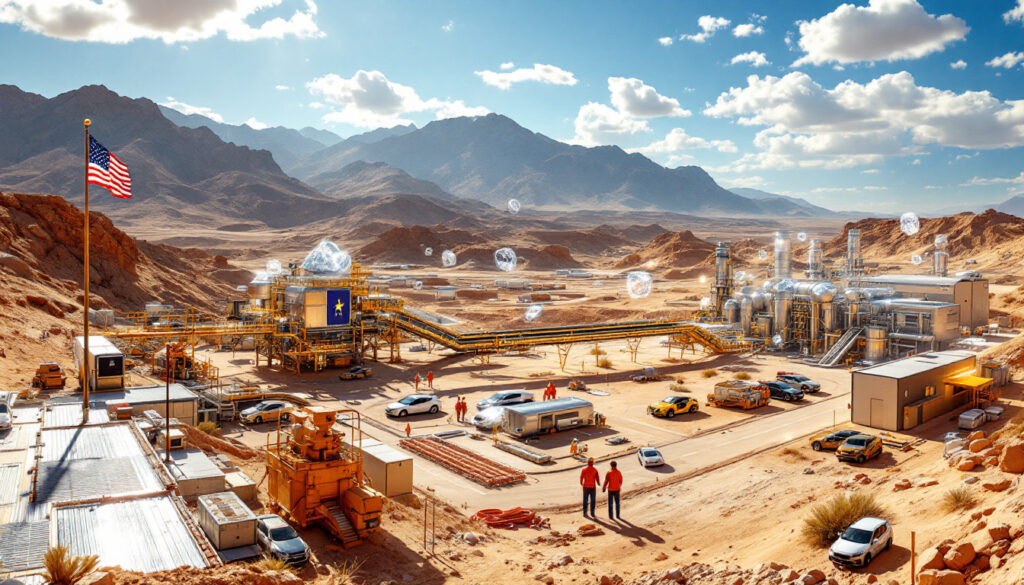What is the EXIM Bank's Letter of Intent to American Battery Technology Company?
The Export-Import Bank of the United States (EXIM) has issued a letter of interest to American Battery Technology Company (NASDAQ:ABAT) for potential financing of US$900 million (approximately $1.4 billion AUD). This significant financial commitment represents a pivotal development in ABAT's strategic efforts to establish domestic lithium production capabilities within Nevada's mineral-rich landscape.
The letter of intent signifies EXIM's preliminary approval and strong interest in supporting ABAT's vision of creating a sustainable, domestic source of battery-grade lithium to serve America's growing electric vehicle and energy storage markets. While not yet a binding commitment, the letter marks a crucial milestone in securing the necessary capital for commercial-scale operations.
According to industry analysts, this level of financial backing from a federal agency not only validates ABAT's technological approach but also underscores the strategic importance of developing domestic lithium ambitions challenges as global demand continues to accelerate. The company's stock responded positively to the announcement, reflecting market confidence in the project's potential.
How Will the EXIM Financing Support ABAT's Nevada Project?
The proposed $900 million financing package is earmarked for the construction of two complementary facilities that together create a vertically integrated lithium operation:
- A commercial-scale lithium mine near Tonopah, Nevada, designed to extract lithium from the region's claystone deposits
- An integrated claystone-to-lithium hydroxide refinery at the same location, capable of processing the extracted material into battery-grade lithium hydroxide
This dual-facility approach represents a significant advancement in domestic lithium production capacity. By combining extraction and processing at a single location, ABAT aims to minimize transportation costs, reduce carbon emissions, and streamline production efficiency.
Industry experts estimate that approximately 60% of the funding will likely be allocated to mine development, with the remaining 40% directed toward the more technically complex refining facility. The vertical integration strategy allows ABAT to capture value across the entire production chain while reducing exposure to lithium market volatility.
Why is This Project Strategically Important for the US?
Alignment with National Initiatives
The ABAT project strategically aligns with two key EXIM Bank initiatives that address critical national priorities:
- 'Make More in America' Initiative: This program is specifically designed to strengthen domestic manufacturing capabilities and reduce dependency on imports for essential materials. By supporting domestic lithium production, the initiative helps secure supply chains for clean energy technologies.
- 'China and Transformational Export Program': This initiative provides preferential financing terms to help US companies compete with Chinese counterparts in strategic sectors. With China controlling approximately 60% of global lithium processing capacity, this program aims to rebalance market dynamics in America's favor.
These initiatives reflect broader US government efforts to reduce dependency on foreign sources for critical minerals, particularly those dominated by strategic competitors.
Addressing Critical Mineral Supply Challenges
Unlike Australia with its abundant hard rock spodumene deposits or South American countries with their vast lithium-rich brine resources, the United States currently lacks significant quantities of conventionally exploitable lithium resources. This geological reality has forced the US to rely heavily on imports, creating strategic vulnerabilities in its battery supply chain.
ABAT's innovative approach focuses on accessing lithium from unconventional claystone deposits that are abundant throughout central Nevada. Geological surveys estimate that Nevada's claystone formations may contain over 10 million tons of lithium, enough to support domestic battery production for decades if efficiently extracted.
By developing technologies specifically tailored to these domestic resources, ABAT could substantially increase American production of battery-grade lithium materials, potentially reducing import dependency by 15-20% within five years of full-scale production.
What Innovative Technologies is ABAT Implementing?
Claystone Processing Innovations
ABAT has developed proprietary technologies specifically optimized for extracting lithium from claystone materials—an approach that differs significantly from conventional extraction methods used for hard rock or brine resources. These innovative processes are characterized as:
- Low-cost compared to conventional extraction methods, with projected operational expenses 20-30% below industry averages
- Low environmental impact with significantly reduced water consumption compared to traditional brine operations, which can use up to 500,000 gallons of water per ton of lithium
- First-of-kind approaches that have been systematically refined through laboratory and pilot-scale demonstrations over several years
The company's selective leaching process uses targeted chemistry to isolate lithium from clay minerals while minimizing the extraction of impurities, resulting in higher-purity intermediate products and more efficient downstream processing.
Technological Validation
The EXIM letter of intent serves as significant external validation of ABAT's technological approach, which has progressed from concept to demonstration scale over the past five years. The company has methodically validated these technologies through:
- Laboratory-scale proof-of-concept testing
- Pilot plant operations processing multiple tons of material daily
- Extensive third-party verification of product quality and process efficiency
This rigorous validation pathway has been crucial in securing EXIM's interest, as the bank typically requires substantial evidence of technological feasibility before issuing financing commitments of this magnitude.
What Does This Mean for the US Battery Supply Chain?
Reducing Foreign Dependency
Currently, lithium products used in US battery manufacturing are primarily sourced from international suppliers, creating vulnerabilities in the supply chain:
- Hard rock spodumene materials from Western Australia, which are typically processed in China
- Lithium-rich brines from South America, primarily Chile and Argentina, which face increasing water scarcity challenges
- Chinese-controlled lithium processing facilities that handle approximately 60% of global lithium refining
ABAT's project aims to reduce this dependency by establishing domestic production capacity of roughly 20,000 metric tons of lithium hydroxide annually—enough to support production of approximately 400,000 electric vehicles per year when operating at full capacity.
Energy security analysts note that domestically sourced lithium could reduce supply chain disruption risks while potentially stabilizing prices in the volatile lithium market, where prices have fluctuated by over 300% in recent years.
Circular Economy Approach
Beyond its primary mining operations, ABAT describes itself as "committed to a circular supply chain for battery metals and recycling." This commitment extends to:
- Developing technologies for lithium-ion battery recycling to recover valuable metals
- Implementing sustainable water management practices at its Nevada facilities
- Minimizing carbon emissions through energy-efficient processing techniques
According to sustainability consultants, this circular approach could potentially recover up to 95% of lithium from end-of-life batteries, significantly extending the lifecycle of critical minerals and reducing the need for primary extraction in the future.
What is the Role of EXIM Bank in This Project?
EXIM's Mission and Function
The Export-Import Bank of the United States serves as the nation's official export credit agency with a mandate that includes:
- Supporting American jobs by facilitating US exports
- Providing financing solutions when private sector funding is unavailable or insufficient
- Leveling the playing field for US companies competing against foreign government-backed enterprises
EXIM's involvement in critical mineral projects has expanded significantly since 2019, when its authorization was renewed with an explicit mandate to counter Chinese dominance in strategic sectors through the China and Transformational Export Program.
Financial Support Structure
The $900 million letter of interest indicates preliminary approval for financing but represents just one step in EXIM's multi-stage approval process:
- The letter confirms EXIM's interest but does not constitute a binding financing commitment
- Final approval would require additional due diligence, environmental reviews, and formal board approval
- Financing terms would likely include favorable interest rates and extended repayment periods under the China and Transformational Export Program
If finalized, this financial support would dramatically accelerate ABAT's commercialization timeline, potentially bringing production online 2-3 years earlier than would be possible with conventional private financing alone.
What Does ABAT's Leadership Say About This Development?
Ryan Melsert, CEO of American Battery Technology Company, emphasized the strategic alignment between ABAT's mission and national priorities:
"This proposed financial support can greatly accelerate the commercialization of our domestic critical mineral mine and refinery, and we are excited to implement at scale the technologies we have been developing over the past several years."
Melsert, who previously led battery materials processing at Tesla's Gigafactory, brings significant technical expertise to the project. His background in scaling battery manufacturing processes at Tesla provides valuable perspective on the challenges of commercializing new technologies in the energy storage sector.
Industry observers note that Melsert's technical background distinguishes ABAT from some other lithium development companies that are led primarily by mining or finance executives rather than battery technology specialists.
How Does This Project Fit Into the Broader Lithium Market?
Global Lithium Supply Context
The global lithium market is currently dominated by a limited number of major producers, creating a concentrated supply landscape:
- Australian hard rock operations controlled by companies like Albemarle, Tianqi, and Mineral Resources
- South American brine operations in Chile's Atacama Desert and Argentina's lithium triangle
- Chinese companies that control the majority of lithium processing capacity worldwide
The United States has been largely dependent on imports for lithium supply, with domestic production accounting for less than 2% of global output despite growing demand from gigafactories being built across the country.
Market analysts project lithium demand to grow by 500% by 2030, driven primarily by electric vehicle battery production. This growing supply gap creates both risks and opportunities for emerging producers like ABAT.
Potential Market Impact
Successful implementation of ABAT's project could establish a significant new source of lithium supply with several market implications:
- Increased domestic production may reduce supply chain vulnerabilities for US battery and EV manufacturers
- New production techniques for claystone resources could potentially be applied to similar deposits globally
- Diversification of supply sources may help moderate price volatility in lithium markets
Mineral economists suggest that while ABAT's production alone wouldn't dramatically alter global supply-demand dynamics, it could serve as a proof-of-concept for claystone lithium extraction that might subsequently be deployed at larger scales.
What is American Battery Technology Company?
Company Profile
American Battery Technology Company represents a new generation of integrated battery materials companies:
- Headquartered in Reno, Nevada, positioning it close to both lithium resources and major battery manufacturers
- Publicly traded on NASDAQ under the ticker ABAT, providing access to capital markets for expansion
- Focused on developing a circular supply chain for battery metals through both primary extraction and recycling
- Led by a technical team with backgrounds in battery manufacturing, materials science, and mineral processing
The company's strategic location in Nevada's mining-friendly jurisdiction provides logistical advantages, with proximity to Tesla's Gigafactory and other emerging battery production facilities in the western United States.
Strategic Vision
ABAT has articulated a multi-faceted strategic vision that extends beyond conventional mining operations:
- Supporting the global transition to electrification through reliable domestic material supply
- Developing sustainable energy solutions that minimize environmental impacts
- Creating resilient domestic supply chains for critical battery materials
- Establishing technological leadership in extracting value from unconventional lithium resources
This integrated approach distinguishes ABAT from pure-play mining companies by emphasizing technological innovation and sustainability alongside resource extraction.
How Could This Development Impact the US Battery Industry?
Domestic Supply Chain Strengthening
The establishment of significant domestic lithium production capability could fundamentally reshape US battery manufacturing dynamics by:
- Reducing dependency on foreign lithium sources, which currently account for over 98% of US lithium consumption
- Shortening supply chains from thousands of miles to hundreds, enhancing logistics efficiency and reducing transportation costs
- Creating a more resilient battery manufacturing ecosystem less vulnerable to international trade disputes or shipping disruptions
Battery industry consultants estimate that locally sourced materials could reduce supply chain disruption risks by 30-40% while potentially cutting logistics-related carbon emissions by up to 25%.
Economic and Strategic Benefits
Beyond the direct operational impacts, ABAT's project offers broader economic and strategic advantages:
- Job creation spanning mining, chemical processing, and advanced manufacturing sectors, with estimates suggesting 150-200 direct jobs and 400-500 indirect positions
- Enhanced national security through reduced dependence on critical mineral imports from geopolitical competitors
- Support for the growing electric vehicle and energy storage industries, which represent key growth sectors in the US economy
Economic impact assessments suggest that each job in critical mineral production supports approximately 3.5 jobs in downstream manufacturing and services, amplifying the project's economic footprint.
Environmental Considerations
While all mining operations have environmental impacts, ABAT emphasizes several sustainability aspects of its approach:
- Low-impact extraction technologies that significantly reduce water consumption compared to brine operations
- Domestic production that may reduce the carbon footprint associated with long-distance transportation of imported materials
- Circular economy principles that aim to maximize resource efficiency and minimize waste generation
The company's integrated mine-to-material approach also permits tighter environmental controls than fragmented international supply chains where oversight may vary significantly between jurisdictions.
Disclaimer: The projected economic impacts, production timelines, and market effects discussed in this article are based on current information and represent estimates that may change as the project develops. Investors should conduct their own due diligence before making investment decisions related to mining stocks mentioned.
FAQ: American Battery Technology and EXIM Financing
What is the current status of ABAT's Nevada lithium project?
The project is currently in the development phase, with ABAT having demonstrated its technologies at laboratory and pilot scales over several years. The company has completed initial resource assessments and process validation work. The EXIM financing would accelerate the construction of commercial-scale operations, potentially moving the project from development to production phase within 24-36 months of financing approval.
How does claystone lithium extraction differ from conventional methods?
Claystone extraction targets lithium embedded in clay deposits rather than the traditional spodumene (hard rock) or brine sources. This requires specialized processing technologies because:
- Lithium in clay is bound within the mineral structure rather than existing as a soluble salt
- Conventional acid leaching methods often co-extract numerous impurities that complicate downstream processing
- Clay deposits typically contain lower lithium concentrations (0.3-0.8%) than premium hard rock sources (1.2-1.5%)
ABAT's selective leaching process uses proprietary chemistry to target lithium while minimizing the extraction of impurities, resulting in more efficient downstream processing.
What makes Nevada's lithium resources unique?
Nevada contains significant deposits of lithium-rich claystone that offer distinct characteristics:
- These deposits are typically near-surface and amenable to simple mining methods
- The dry climate reduces water management challenges compared to operations in wetter regions
- Nevada's established mining infrastructure and regulatory framework support efficient project development
- Many deposits are located on federal land with established permitting processes
While these deposits require innovative extraction methods, they represent one of America's largest untapped lithium resources, with estimates suggesting Nevada could potentially support production of hundreds of thousands of tons of lithium compounds annually if fully developed.
What timeline can be expected for project development?
While specific timelines weren't detailed in the announcement, industry experience suggests the following approximate development schedule:
- 6-12 months: Final engineering and permitting processes
- 12-24 months: Construction of mining operations and initial processing facilities
- 18-30 months: Construction and commissioning of refining operations
- 24-36 months: Ramp-up to full production capacity
The EXIM financing would significantly accelerate this process by eliminating potential delays in securing capital through multiple smaller funding rounds, potentially bringing production online 2-3 years earlier than otherwise possible.
How does this project contribute to US climate goals?
By establishing domestic lithium production, the project supports several key aspects of US climate strategy:
- Facilitating the transition to electric vehicles by securing battery material supply chains
- Supporting renewable energy storage deployment, which requires large quantities of lithium-ion batteries
- Potentially reducing the carbon footprint of lithium supply by shortening transportation distances
- Implementing more efficient processing technologies with lower energy intensity than some conventional methods
Energy transition analysts estimate that each electric vehicle requires approximately 8-10kg of lithium, meaning ABAT's projected 20,000 tons of annual production could potentially support the manufacture of 400,000 EVs per year when at full capacity.
Further Exploration:
Readers interested in learning more about developments in domestic lithium production can explore related educational content at Reuters' coverage of ABAT's financing, which offers additional perspectives on critical mineral projects and digital mining transformation.
Ready to Monitor Critical Mineral Developments Like This?
Stay ahead of market-moving announcements in the Australian minerals sector with Discovery Alert's proprietary Discovery IQ model, delivering real-time notifications of significant discoveries on the ASX. Discover why investors value immediate intelligence on developments like ABAT's $900 million EXIM financing by visiting our discoveries page and start your 30-day free trial today.




